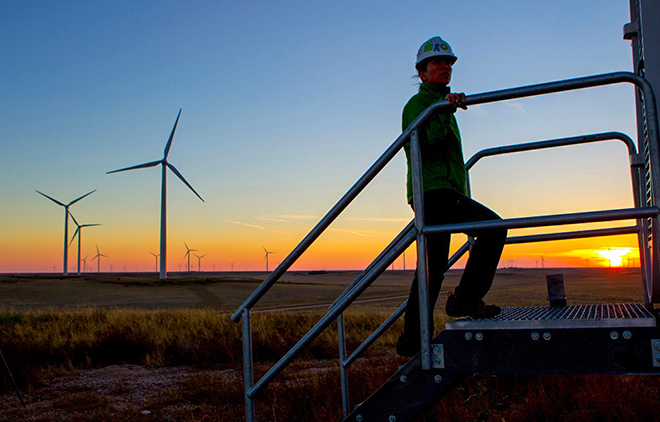Featured Topics
Featured Products
Events
S&P Global Offerings
Featured Topics
Featured Products
Events
S&P Global Offerings
Featured Topics
Featured Products
Events
S&P Global Offerings
Featured Topics
Featured Products
Events
Financial and Market intelligence
Fundamental & Alternative Datasets
Government & Defense
Professional Services
Banking & Capital Markets
Economy & Finance
Energy Transition & Sustainability
Technology & Innovation
Podcasts & Newsletters
Financial and Market intelligence
Fundamental & Alternative Datasets
Government & Defense
Professional Services
Banking & Capital Markets
Economy & Finance
Energy Transition & Sustainability
Technology & Innovation
Podcasts & Newsletters
22 Jun, 2021
By Yannic Rack

| A BP wind farm in Colorado. The company has no plans to speed up its energy transition strategy. |
BP PLC CEO Bernard Looney said there is no need to strengthen the oil major's energy transition strategy despite growing calls from investors to cut greenhouse gas emissions more quickly.
More than 20% of BP shareholders voted for a resolution brought by Dutch activist group Follow This at the company's annual general meeting in May, asking BP to cut its absolute carbon emissions in line with the Paris Agreement on climate change. Despite opposition from BP's board, support for the motion more than doubled from the last time a similar resolution was filed in 2019.
But BP, which claims its strategy is aligned with the Paris climate accord, managed to win over a growing slice of its shareholders since it outlined how to achieve its low-carbon strategy last year, Looney said June 22 at the virtual Global Energy Transition conference, organized by Reuters Events.
"I feel growing confidence amongst our shareholders in our strategy," Looney said. "[T]hat has taken a little bit of time. I think it took a while for our investors to get their hands around what it is we're trying to do."
Support for climate-related proxy votes has also risen at other oil companies in Europe and the U.S. But while BP avoided the kind of high-profile defeats suffered by U.S. companies Chevron Corp. and Exxon Mobil Corp., pressure on the industry to decarbonize more quickly is rising across the board. Royal Dutch Shell PLC recently lost a court case in the Netherlands that will force the company to speed up its emissions cuts, and campaigners have said they will file similar lawsuits against other major polluters.
Looney said BP has "leaned into" the transition out of fossil fuels "as hard as we can," pointing in particular to its plan to cut oil and gas production by 40% by 2030 — a move the CEO said most oil companies have shied away from. Shell said it will reduce its oil production by up to 2% per year but will also grow its gas business at the same time. BP's plans exclude its stake in Russian oil giant PJSC Rosneft Oil Co.
Oil and gas majors have also made a point of emphasizing a value-over-volume approach as criticism of the industry has intensified. Anders Opedal, president and CEO of Norway's Equinor ASA, said at the Reuters conference that "the winners in oil and gas will be the most competitive barrels." Equinor still plans to grow its oil and gas production until 2030 before it starts cutting back.
Looney acknowledged that BP's transition strategy will evolve but held firm to its current goals to reduce direct emissions by about one-third by 2030 and to cut the carbon intensity of BP's products — where most emissions are generated — by more than 15%. By 2050, the company wants to reach net-zero emissions, although it excludes its trading activities.
"Of course expectations will grow, and of course our strategy will evolve over time. But I feel in a good place today with the strategy that we have," Looney said.
UK seabed leases
Looney also pushed back against charges that BP is overpaying for offshore wind assets, driving up the cost of renewable energy in the process.
The company was criticized for paying record-breaking prices to acquire seabed licenses for offshore wind farms in the U.K. after it successfully bid in a competitive auction with German utility EnBW Energie Baden-Württemberg AG earlier this year. Critics, including Mads Nipper, the CEO of offshore wind industry leader Ørsted A/S, said BP is overpaying to get its foot in the door and thereby damaging the industry's competitiveness.
But Looney said the price for the seabed rights was justified since the Irish Sea — where its acreage is located — has several advantages, including shallower water, closer proximity to shore and fewer migratory birds, which will speed up approvals.
"We didn't pay a premium. We paid a good price for a good asset," Looney said, pointing to financial institutions and operating companies which the CEO said would pay even more to get their hands on the wind farm projects. "We are not in a rush here. There is no panic," Looney said.
BP wants to gradually increase its annual investments in renewable energy to $5 billion by 2030. Last year, it paid $1.1 billion to buy into some of Equinor's offshore wind projects in the U.S.